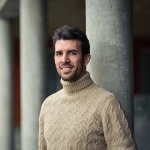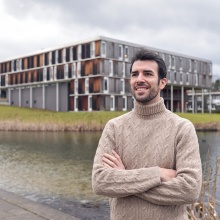The Gastdozentenhaus, at the heart of the Vaihingen Campus, is designed to accommodate doctoral students, lecturers and researchers for periods of up to six months. It is also aimed at newly-appointed professors as well as Alexander von Humboldt fellowship holders. There are 39 apartments available in total, ranging from one-bedroom apartments up to large three-bedroom apartments for families. Jonathan Leutwyler is the contact person for the guests and is based in the Office of the Chancellor. Finding accommodation for guests of the University is important to Chancellor Jan Gerken. The work being done to develop the concept further as part of the “Next Guest House” project is also something which is close to his heart. Gerken explains: “The University of Stuttgart being responsible for running the Gastdozentenhaus creates even closer ties between us and the visiting researchers who come to us from all around the world. What’s more, with the Operations Manager office we can meet their needs directly.”
Mr Leutwyler, what are you working on at the moment, how busy are you?
Jonathan Leutwyler: At first I thought demand would still be low because of the pandemic, but it's been the opposite. The building is well occupied and we’ve had a lot of interest. I’m very happy to see scientific exchange still going on despite all the challenges. We’re a good reflection of the world in general, we’ve got a lot of Indians and Chinese at the moment. Those living at the Gastdozentenhaus come from a wide range of departments. We have a wide range of ages as well, there are currently six children living in the building.
I’m the contact person for all these different people, and at the same time I’m the link between the Central Administration and the University. I learn something new every day in my job. People come to me with a whole range of issues, whether it’s because they need a new office chair due to back problems or because the hot water isn’t working. I then try and sort these issues out, and for example get in touch with Division 6. We have a close working relationship with the institutes and facilities at the University. We have to be flexible, because a lot of plans can change quickly due to the coronavirus. For example, arrival dates often can’t reliably be organized in advance.
Are there any suggestions or ideas for how the use of the building can be developed further?
JL: Yes, the second part of my job involves re-evaluating the building with the “Next Guest House” team. The team includes representatives from the university administration, as well as the architect and Head of the Developer-Owned Construction and Project Management Office Susanne Rihm, other architects from the University of Stuttgart, as well as representatives from the Fraunhofer Institute for Industrial Engineering and Heilbronn University. I use my experiences from the previous building. For example, we want to find new digital solutions for the booking system and for processing requests. It’s also a question of thinking about what needs our different guests have and what we want to offer them.
What is particularly important to you?
JL: I’ve spent some time abroad myself, and I’ve got very good memories of it. It’s not just about making sure our guests have somewhere to live. I want to make the University of Stuttgart an exciting and interesting place for the researchers, so that they enjoy coming back here and they tell people back home that it’s a great place to be. Of course we also want to keep the researchers with us and gain recognition on the international stage. Therefore, what can we offer as a university and what do we want to offer? For example, this could mean providing opportunities for people living in the building to get to know one another, as well as members of staff at the University. They shouldn’t just live next to one another, but should also make connections across disciplines and be able to get involved. I want to encourage our guests to build networks, and integrate them into existing events such as staff barbecues and the like.
The Swiss native Jonathan Leutwyler spent part of his childhood living in the USA, where he grew up among people from different cultures. He also made a number of international contacts at the International School in Basel. While studying English and History as part of his teaching degree at the University of Stuttgart, Leutwyler worked as a tutor for an international project led by Dr. Wolfgang Holtkamp, where he visited universities in other participating countries such as India, Russia, South Africa and the USA.
Contact

Jonathan Gulden
Operations manager of the guest house




